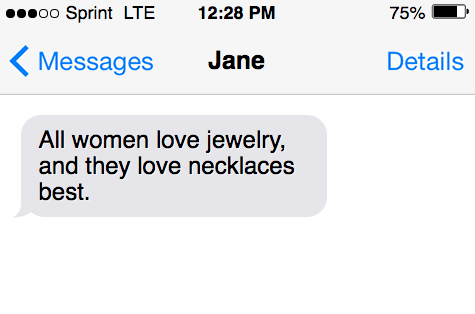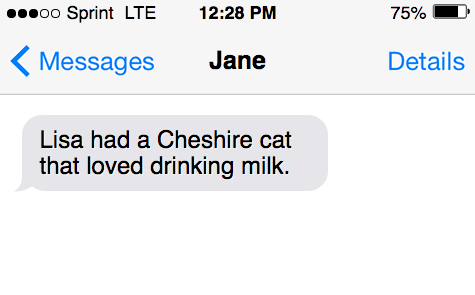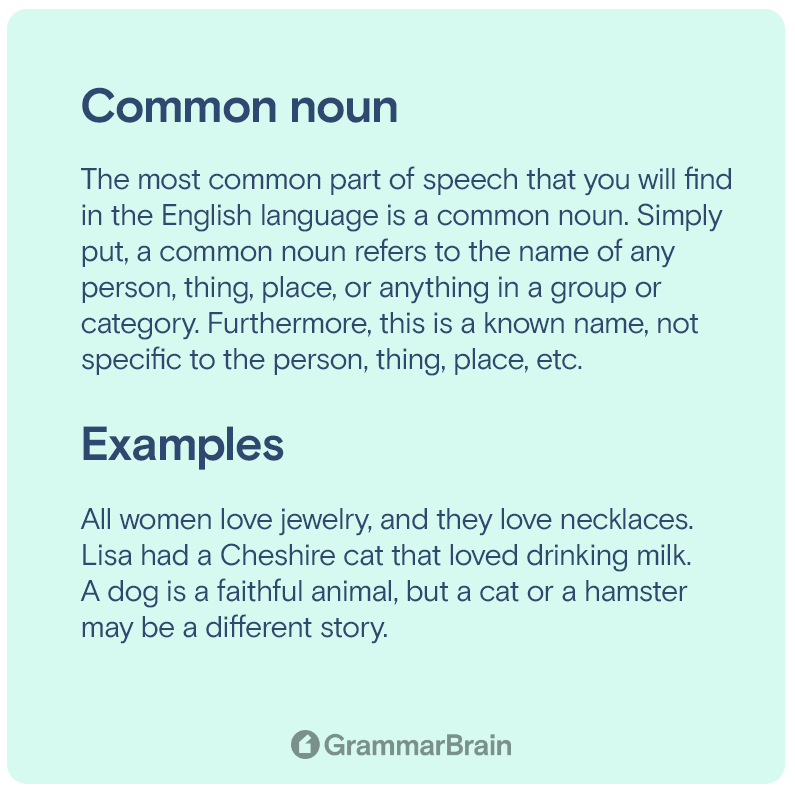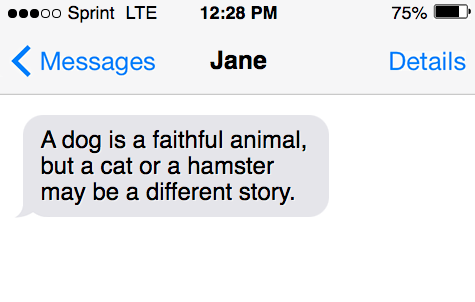What is a common noun? And how can I tell which is a regular noun or a common noun? Is there a difference? What about the difference between a common and proper noun, how does that work?
Get answers to these questions and more in this simple grammar worksheet…
What is a common noun?
The most common part of speech that you will find in the English language is a common noun.
Simply put, a common noun refers to the name of any person, thing, place, or anything in a group or category. Furthermore, this is a known name, not specific to the person, thing, place, etc.

Common nouns can be abstract (like qualities and ideas) or concrete (tangible things).
Common nouns can be collective in nature as well.
This represents a collection or a group.
It’s important to note that every noun is usually an object or person, or place.
A common noun is not one of these, while a proper noun is specific to a particular thing, place, person, etc. Let’s break this down.
Examples in sentences
Here are some good examples to display common nouns:
- All women love jewelry, and they love necklaces best.
- Lisa had a Cheshire cat that loved drinking milk.
- A dog is a faithful animal, but a cat or a hamster may be a different story.
- Billy is a successful climber who has achieved much by climbing Mount Everest.
- If the doorbell doesn’t work, be sure to use the door knocker.
Are common nouns lowercase or uppercase?
Unless a common noun begins a sentence, it is never uppercase. Assigning lowercase letters and capitals to words is a perennial issue and getting this right is critical to understanding the basics of the English language.
Frequently, spelling errors get created because they don’t use upper and lower cases appropriately.
Some common nouns, such as a president, may mislead you to think it requires a capital letter, for example.
This is because the word represents a person of authority. Unless the word is placed before the name of a particular president, the word does not start with a capital “p”.

Examples in sentences
Here are some instances of incorrect and correct sentences:
Incorrect sentence – The King is the ultimate Monarch and Ruler.
Correct – The king is the ultimate monarch and ruler.
Incorrect sentence – What is a Common Noun?
Correct sentence – What is a common noun?
Incorrect sentence – The term of president Theodore Roosevelt began in 1901.
Correct sentence – The term of President Theodore Roosevelt began in 1901.
Incorrect sentence – I was lucky to be invited to the governor’s ball this saturday.
Correct – I was lucky to be invited to the Governor’s Ball this Saturday.
Incorrect sentence – Einstein and Hubble theorized about the universe’s Cosmological Expansion.
Correct sentence – Einstein and Hubble theorized about the universe’s cosmological expansion.

Difference between common nouns and proper nouns
The distinguishing factors between proper and common nouns are generally easy to decipher.
When you use nouns in speech, it does not make any difference whether any noun is common or proper. This is because the syntax of speech isn’t influenced by them.

Every word that names something can be categorized as proper or common nouns. A common noun means a thing, a person, a place. A common noun is generic noun word form.
Here are examples of common nouns:
- castle
- novel
- film
- song
- boy
Examples of proper nouns:
A proper noun is a specific and precisely unique name for something, as shown below:
- Hampton Court
- Paris
- Jack and Jill
- War and Peace (a novel)
- Rihanna
| Common Noun | Proper Noun |
| Man, Boy | Henry |
| Woman, Girl | Mary |
| Book, Film | Goodwill Hunting |
| Month, Day of the Week | January, Wednesday |
| Company | Tesla, SpaceX |
What is the most common way to form the plural of a noun and a common noun?
As you may have already guessed, the most common way to form any plural is simply by adding an “s” at the end of a noun. Look at the following examples:
- “Boat” becomes “boats”
- “House” becomes “houses”
- “Dog” becomes “dogs”
- “River” becomes “rivers”
- “Girl” becomes “girls”
Although, there are some caveats. You cannot simply add an “s” to any common noun.
Highlighted below are some rules for making nouns pluralized:
- When singular nouns end in the letters s, z, x, sh, or ch, the plural is made by adding “es” to the singular. Examples: bus (buses), church (churches), box (boxes), wish (wishes), etc.
- When singular nouns end with consonants (any letters that are not vowels) and a “y”, the plural is formed by adding “ies” and dropping off the “y”. Examples: story (stories), spy (spies), daisy (daisies), etc.
Some irregular nouns may not follow any of the rules mentioned, like woman. Woman changes to “women,” and person becomes “people.”
FAQs
What’s the difference between common and proper nouns?
With the two main types of nouns – proper and common – we can differentiate between the two by saying that a common noun is a general way of classifying something, and a proper noun is a specific way of classifying something
What are abstract nouns?
Can there be a proper noun equivalent for a common noun?
Yes.
What are common noun examples?
Mug, Ocean, New York.
What are countable nouns?
Countable nouns refer to individual items that can be counted or weighed. Uncountable nouns are the opposite.
Do you capitalize proper adjectives after a common noun?
Yes, you should always capitalize proper adjectives after a common noun.
More on nouns
More resources about nouns:
- Possessive nouns
- Irregular plural nouns
- Proper nouns
- Concrete nouns
- Collective nouns
- Possessive and plural nouns
References:
- What is a Common Noun? | Grammarly
- What is a Common Noun? Definition, Examples of Common Nouns – Writing Explained
- What is a Common Noun? – Definition & Examples – Video & Lesson Transcript | Study.com
- What Is a Common Noun? | Definition & Examples (scribbr.co.uk)
Inside this article
Fact checked:
Content is rigorously reviewed by a team of qualified and experienced fact checkers. Fact checkers review articles for factual accuracy, relevance, and timeliness. Learn more.
Core lessons
Glossary
- Abstract Noun
- Accusative Case
- Anecdote
- Antonym
- Active Sentence
- Adverb
- Adjective
- Allegory
- Alliteration
- Adjective Clause
- Adjective Phrase
- Ampersand
- Anastrophe
- Adverbial Clause
- Appositive Phrase
- Clause
- Compound Adjective
- Complex Sentence
- Compound Words
- Compound Predicate
- Common Noun
- Comparative Adjective
- Comparative and Superlative
- Compound Noun
- Compound Subject
- Compound Sentence
- Copular Verb
- Collective Noun
- Colloquialism
- Conciseness
- Consonance
- Conditional
- Concrete Noun
- Conjunction
- Conjugation
- Conditional Sentence
- Comma Splice
- Correlative Conjunction
- Coordinating Conjunction
- Coordinate Adjective
- Cumulative Adjective
- Dative Case
- Determiner
- Declarative Sentence
- Declarative Statement
- Direct Object Pronoun
- Direct Object
- Diction
- Diphthong
- Dangling Modifier
- Demonstrative Pronoun
- Demonstrative Adjective
- Direct Characterization
- Definite Article
- Doublespeak
- False Dilemma Fallacy
- Future Perfect Progressive
- Future Simple
- Future Perfect Continuous
- Future Perfect
- First Conditional
- Irregular Adjective
- Irregular Verb
- Imperative Sentence
- Indefinite Article
- Intransitive Verb
- Introductory Phrase
- Indefinite Pronoun
- Indirect Characterization
- Interrogative Sentence
- Intensive Pronoun
- Inanimate Object
- Indefinite Tense
- Infinitive Phrase
- Interjection
- Intensifier
- Infinitive
- Indicative Mood
- Participle
- Parallelism
- Prepositional Phrase
- Past Simple Tense
- Past Continuous Tense
- Past Perfect Tense
- Past Progressive Tense
- Present Simple Tense
- Present Perfect Tense
- Personal Pronoun
- Personification
- Persuasive Writing
- Parallel Structure
- Phrasal Verb
- Predicate Adjective
- Predicate Nominative
- Phonetic Language
- Plural Noun
- Punctuation
- Punctuation Marks
- Preposition
- Preposition of Place
- Parts of Speech
- Possessive Adjective
- Possessive Determiner
- Possessive Case
- Possessive Noun
- Proper Adjective
- Proper Noun
- Present Participle
- Prefix
- Predicate



